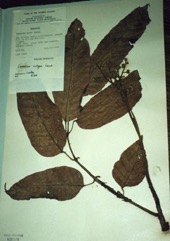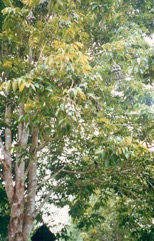Pili nut, Java-almond

It is a tropical plant. It does well on limestone soils.
Also known as:
Chinese-olive, Gisau, Kenari nut-tree
Synonyms
- Canarium commune auct.
- Often confusion with Canarium indicum L.
Edible Portion
- Nuts, Seeds
Where does Pili nut grow?
Found in: Asia, Cook Islands, East Timor, Fiji, FSM, Hawaii, Indonesia, Malaysia, Pacific, Papua New Guinea, PNG, Pohnpei, Philippines, SE Asia, Solomon Islands, Sri Lanka, Timor-Leste, United States, Vanuatu
Notes: This plant is very similar to Canarium indicum but considered separate. The names have often been confused. There are 80-95 Canarium species.
Growing Pili nut, Java-almond
Cultivation: Plants are grown from seeds.
Edible Uses: The seeds are eaten. An oily mixture made from the seeds is used as a baby food.
Nutrition Info
per 100g edible portion| Edible Part | Energy (kcal) | Protein (g) | Iron (mg) | Vitamin A (ug) | Vitamin c (mg) | Zinc (mg) | % Water |
|---|---|---|---|---|---|---|---|
| Nuts | - | - | - | - | - | - |
Pili nut, Java-almond Photos


References
Arora, R. K., 2014, Diversity in Underutilized Plant Species - An Asia-Pacific Perspective. Bioversity International. p 93
Barwick, M., 2004, Tropical and Subtropical Trees. A Worldwide Encyclopedic Guide. Thames and Hudson p 89
Bernice P. Bishop Mus. Bull. 216:31, fig. 13; Blumea 8:188. 1955
Bradacs, G., 2008, Ethnobotanical Survey and Biological Screening of Medicinal Plants from Vanuatu. PhD thesis Frankurt University. p 101
Coronel, R.E., 1982, Fruit Collections in the Philippines. IBPGR Newsletter p 9
Cowie, I, 2006, A Survey of Flora and vegetation of the proposed Jaco-Tutuala-Lore National Park. Timor-Lests (East Timor) www.territorystories.nt/gov.au p 45
French, B.R., 2010, Food Plants of Solomon Islands. A Compendium. Food Plants International Inc. p 167
Heyne, 1927, Nutt. pl. p 873 (About use as baby food)
Leenhouts, P.W., 1955, Canarium in the Pacific, Bernice P. Bishop Museum Bulletin 216 p 31
Menninger, E.A., 1977, Edible Nuts of the World. Horticultural Books. Florida p 27
Smith, A.C., 1985, Flora Vitiensis Nova: A New flora of Fiji, Hawai Botanical Gardens, USA Vol 3 p 473
Soepadmo, E. and Wong, K. M., 1995, Tree Flora of Sabah and Sarawak. Forestry Malaysia. Volume One. p 48
USDA, ARS, National Genetic Resources Program. Germplasm Resources Information Network - (GRIN). [Online Database] National Germplasm Resources Laboratory, Beltsville, Maryland. Available: www.ars-grin.gov/cgi-bin/npgs/html/econ.pl (10 April 2000)
Walter, A. & Sam C., 2002, Fruits of Oceania. ACIAR Monograph No. 85. Canberra. p 131, 279
Wickens, G.E., 1995, Edible Nuts. FAO Non-wood forest products. FAO, Rome. p 111
World Checklist of Useful Plant Species 2020. Royal Botanic Gardens, Kew
www.pngplants.org